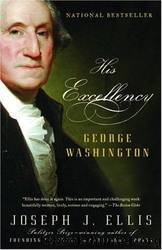His Excellency: George Washington by Ellis Joseph J

Author:Ellis, Joseph J. [Ellis, Joseph J.]
Language: eng
Format: epub
Tags: Generals - United States, Revolutionary Period (1775-1800), Historical, Biography & Autobiography, Politics, Washington, United States, Military, Generals, Biography, History, Colonial Period (1600-1775), George, Presidents, Presidents & Heads of State, Presidents - United States, General
ISBN: 9781400032532
Amazon: 1400032539
Goodreads: 6462
Publisher: Vintage
Published: 2004-01-01T08:00:00+00:00
THIS SPECIES OF PROPERTY
IN DECEMBER 1785, Washington received a letter calculated to focus his mind on another worrisome association even more damaging to his abiding public image than the Society of the Cincinnati. It came from Robert Pleasants, a Virginia Quaker who had recently emancipated all eighty of his own slaves and minced no words in instructing Washington to do the same: âHow strange then it must appear to impartial thinking men, to be informed, that many who were warm advocates for that noble cause during the War, are now sitting down in a state of ease, dissipation and extravigence on the labour of slaves? And most especially that thou . . . should now withold that inestimable blessing from any who are absolutely in thy power, & after the Right of freedom, is acknowledged to be the natural & unalienable Right of all mankind.â Pleasants somewhat gratuitously suggested that Washington had probably been too preoccupied with the inevitable details of his retirement routine to think about âa subject so Noble and interesting,â because once he did think about it, his response must be as self-evident as those truths that Jefferson had enshrined in the Declaration of Independence.
Pleasants did not stop there. He concluded with a little lecture designed to strike Washington, otherwise invulnerable, in his most vulnerable spot. If he acted decisively at this propitious moment by freeing his slaves, it would crown his career and assure his place in the history books. But if he faltered and lost this opportunity, the failure would haunt his reputation forever: âFor not withstanding thou art now receiving the tribute of praise from a grateful people, the time is coming when all actions shall be weighed in an equal balance, and undergo an impartial explanation.â How sad it would then be to read that the great hero of American independence, âthe destroyer of tyranny and oppression,â had failed the final test by holding âa number of People in absolute slavery, who were by nature equally entitled to freedom as himself.â28
Washington did not answer Pleasantsâs letter. He was not accustomed to being the butt of lectures, especially from strangers dripping with moral superiority, and most especially from Quakers, whose pristine consciences had obliged them to sit out the war as spectators. Nevertheless, the letter could not be summarily dismissed as a mere irritation. It linked the subject Washington cared about most, posterityâs judgment, with the subject he had come to recognize as the central contradiction of the revolutionary era. Which is to say that Pleasants was incorrect in assuming that Washington had given little thought to the question of slavery. To be sure, the subject remained the proverbial ghost at the banquet, so obviously and ominously a violation of all the Revolution stood for that no one felt free to talk about it openly, lest the guests at the table transform the polite conversation into a shouting match. Despite the code of silence and circumspection, there is considerable evidence that slavery was very much on Washingtonâs mind during his retirement.
Download
This site does not store any files on its server. We only index and link to content provided by other sites. Please contact the content providers to delete copyright contents if any and email us, we'll remove relevant links or contents immediately.
| Afghan & Iraq Wars | American Civil War |
| American Revolution | Vietnam War |
| World War I | World War II |
Waking Up in Heaven: A True Story of Brokenness, Heaven, and Life Again by McVea Crystal & Tresniowski Alex(37808)
Empire of the Sikhs by Patwant Singh(23085)
We're Going to Need More Wine by Gabrielle Union(19046)
Hans Sturm: A Soldier's Odyssey on the Eastern Front by Gordon Williamson(18590)
Leonardo da Vinci by Walter Isaacson(13336)
The Radium Girls by Kate Moore(12028)
Tools of Titans by Timothy Ferriss(8394)
Educated by Tara Westover(8054)
How to Be a Bawse: A Guide to Conquering Life by Lilly Singh(7486)
Permanent Record by Edward Snowden(5847)
The Last Black Unicorn by Tiffany Haddish(5635)
The Rise and Fall of Senator Joe McCarthy by James Cross Giblin(5280)
Promise Me, Dad by Joe Biden(5153)
The Wind in My Hair by Masih Alinejad(5095)
A Higher Loyalty: Truth, Lies, and Leadership by James Comey(4963)
The Crown by Robert Lacey(4814)
The Iron Duke by The Iron Duke(4354)
Joan of Arc by Mary Gordon(4110)
Stalin by Stephen Kotkin(3965)
